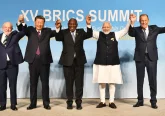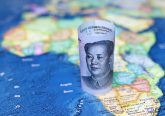A colleague recently commented at an academic conference on revolutionary movements that, ‘There is no Bob Marley for today’s generation of Black African and Caribbean Artists.’ The implication was that the critical revolutionary consciousness of some musicians of the 60s and 70s – such as the ‘redemption songs’ of reggae artist, Bob Marley – is lacking in contemporary African and Caribbean musical political consciousness. This interview with Cameroonian rap-reggae artist, Soumalek of the group Sumanja, shows how Cameroonian rap – or, le rap mboa in Camfrancanglais (the combination of pidgin English, French, English and local languages that is spoken by many Cameroonians, particularly the urban youth) – provides critical insights into the lived experiences of the global capitalism of uneven development in urban Cameroon. Rap, reggae, hip-hop and a combination of the three continue to create networks of global connectivity and unity that surpass the nation state and serve as popular cultural platforms for social justice issues. However, significant problems in promotion and production at both the national and international levels limits visibility and audience accessibility.
* * *
Interview with Cameroonian Rap-Reggae Artist, Soumalek
Amber: What is particular about the ‘le rap mboa’ and what draws you to it? [Mboa is a Camfrancanglais word derived from the Douala language; it is roughly translated as homeland or country.]
Soumalek: Le rap mboa means African rap. From the beginning, my rhythm was ‘hard core’ rap, this was when I was still performing with Core Supreme. As I developed, I wanted to get away from the American style and develop more of a Cameroonian genre – what we call the ‘rap mboa’ . It is a rap genre adapted with local techniques: The sounds of the forest, tam-tams, the ndjimbé, the guitar. We use our languages: Pidgin, different patwas and Camfrancanglais.
To develop more of my own particular sound I decided to form another group in 2000, called Sumanja. I recruited Njoya, who had the same musical ideology as myself. Within the group, I represent reggae-rap, Njoya represents rap and Tangui represents the forest and the traditional. He specialises in forest cries and traditional musical sounds of Central Africa. Our group is called Sumanja; it means solidarity, the universal, the mother, Africa, and birth in joy and in love. When compiling our first CD, we amassed some 60 titles – we had so much to say! – before finally settling with 17 tracks.
We sing for everyone. We sing for the young. We sing for the party, we sing to deliver messages, we sing to provide solutions to problems that we see, we sing to encourage the youth. To valorize women, children, to promise peace, to provide advise, particularly at those who practice corruption. We sing for women; for the mother of humanity. It is not to provoke, but it is also the law of show business. We try to give messages that would make God proud.
Amber: What are a few of Sumanja’s messages concerning local politics?
Soumalek: The first thing that a politician must consider is the youth. Normally, the state must support the youth. Yes, it is true, not everyone goes to school in Cameroon but the state should see into the future and support the youth in their respective domains. For example, musicians and artists should be supported. There is no open bureau for the uneducated. Artists are perhaps kids who didn’t have the material or money necessary to continue their education. I will tell you something I say to my friends, we [artists] are aliens. Despite the difficulties, we continue singing and producing.
Amber: What political messages do you have for Cameroonian youth?
Soumalek: Our fight is conducted alone. I sing that we need to be soldiers: we need to be strong in our heads and strong in our spirits. We need to believe in God. We are here to bring hope for our brothers and sisters in the ghetto. We continue to sing that tomorrow, it will be better. [That being said,] people want to listen to music, they want to drink their beer. It seems like politics don’t interest the youth. Politics are the stories for the older generation.

Amber: You mentioned the ghetto just now and you reference this space often in your work; what is the significance of the ghetto as a space of origin in your music?
Soumalek: Do not forget where you come from. [The great Cameroonian football striker] Samuel Eto’o was from a poor family; his mother was a small merchant at the local market. She sold to support him, a grand star. [A similar story with] Nelson Mandela… we are trying to say that the ghetto makes us, that we lived through things during our childhood and that we live through things [now], that make us what we are today. We sing to pay homage to the ghetto. We are proud; the ghetto has a particular mentality but we want to leave it behind. We want to leave the ghetto, but to never forget that that is where we are from. It is our source.
Our enslaved and colonised ancestors and family members worked on the plantations and whenever there was a little pause, they clapped and cried and sang. Through music they motivated themselves and their brothers and sisters. The foundation of hip-hop is sufferance, the ghetto and perseverance. Hip-hop is not for the rich. It is to inspire and this is a mission that the artists who have gotten out [of the ghetto] do not forget.
Amber: What is the process for an artist to ‘get out’?
Soumalek: There are two problems. Piracy and the fact that there is more of an international audience for Cameroonian rap than a Cameroonian audience sometimes.
As an artist, you find your music everywhere – but you haven’t made any money. We don’t have the support of the state and we don’t have the support of the public, who prefer to purchase a CD at 300 CFA [approximately 60 cents USD] than at 2,000 CFA [approximately $4 USD]. The producers prefer to produce foreigners. All this, and we have actually reduced the price of CDs; we now sell them for 1000 CFA.
Also, the DJs here also don’t valorize local hip-hop or rap artists. They play Nigerian, French and American music… briefly, foreign artists more than local ones. Also, the producers prefer to spend 350,000,000 CFA to pay Akon to perform. Local groups do not even get paid 50,000 CFA. We feel marginalized. I have been to several other countries, I’ve been to Gabon for a music festival, South Africa, Mali, Nigeria – I saw how it worked there: They valorized local groups and the base of each festival was made up of local groups. The state pays them, sponsors are behind them. In Gabon, 50 Cent came to perform, but local groups went onstage after him. In a sense, that is to say that local groups did not open the stage for anyone. They were honored with the last performance. Here in mboa it is a perpetual battle. Everyday, it is the same battle.
Amber: Do you consider poverty to be a primary source of piracy?
Soumalek: Yes, we talk about poverty. Perhaps people pirate because they don’t have the money to pay for a CD. But at the same time, I say it is somewhat false because if you want to really encourage your brother to sing, you would pay 100 CFA everyday over a ten day period, or even 50 CFA in 20 days. I think it is a question of will. People want to do things the easy way. It is the same thing when we have performances, the entrance cost is 1000 CFA but there aren’t very many people who come because they say, ‘Oh it is just my brother.’ When it is an Ivorian or a French group, they come running despite the 5000 CFA ticket price.
Even reaching a local audience is difficult. There are few concert rooms. There are rarely organized concerts and they pay foreign groups more. They will have us come, but they will give the group 50,000 CFA. That is not much if you have your rent to pay and your family to support.
I think that if I leave and go somewhere else, it will roll faster and better for me. But I keep the hope that here, someday the things will change… but while I am waiting, it is very complicated.

Amber: Has the Internet allowed you to reach a wider audience?
Soumalek: The Internet has changed things, yes. It is important because local TV stations rarely play our songs. You have a clip, but they make you pay 1 million CFA or 250,000 CFA to have your clip play on the local station. How can we promote ourselves when they prefer to play other genres or foreign clips? They might play your song once or twice for 30,000 CFA but then they forget.
Honestly, I don’t think I’ll make it in Cameroon. I wanted to make a career of it… but if I can’t pay my rent with my music…
Amber: What advice do you have for the new generation of rap mboa artists?
Soumalek: My advice for Cameroonian youth is to unite. Work together. When one child complains or protests while the others are still in their bedrooms no one will take you seriously. I want us to make a syndicate – one that will defend the hip-hop artist’s rights. For example, I saw that in Nigeria there are youth syndicates and when a group produces a CD the entire group – of something like 10,000 members – purchases the CD. Even if you sell your CD at 1000, that already makes you 10,000,000. Struggle. Work together.
* * *
The question of circulation. I want to return briefly to my colleague’s assertion that the international music scene lacks a contemporary Bob Marley. There are many angles to explore wherein: The relative silencing of the post-colonial national liberation projects. Global market domination by the major record companies, who decide which artists are marketable, in what ways and to which audiences. Uneven consumer power along racial, class and gender lines, which drives the global market in a particular direction, suited to particular tastes. Linguistic ethnocentrism in the global hip-hop market, where songs in certain languages (particularly English) are preferred to those in other languages. The appropriation of Black musical genres to market to mass (read white) audiences.
Bob Marley’s music transported the philosophies and the words of Rastafarian thought to the international scene, facilitating its proliferation around the globe. Over time and as his popularity increased, Marley’s lyrics transcended Jamaican resistance and came to be seen as the embodiment of the global Black struggle.
However, marketing for a global audience changed Marley’s music, image, and ideology. In 1973 Bob Marley and the Wailers released Catch A Fire, their first album for Island Records. A long guitar solo was added to the album’s opening song, Concrete Jungle. The change was designed to make the CD more marketable to English consumers. This guitar solo was specifically marketed to make the product more accessible to England’s predominantly white rock audience. Reggae tracks were made longer. Instead of the traditional three-minute reggae songs, Catch A Fire included nine tracks that were four minutes or longer.
Marley’s commercial success with North American and European whites was a result of the profusion of percussion instruments, remarkable writing talents and the conscious marketing of Marley’s image. Lee Perry, creative producer to the Wailers, discerned in Marley a marketable persona: Marley was ‘charismatic, dreadlocked, [and] half-white’; Perry worked to shape Marley into a ‘third world Jimi Hendrix’ who would be embraced by European and North American audiences (Chang 49).
Dave Thompson (2002) in his text, Reggae and Caribbean Music, argues that the global market appropriation of his music and image ‘utterly emasculated Marley’ (159). Thompson argues,
‘Gone from the public record is the ghetto kid who dreamed of Che Guevara and the Black Panthers, and pinned their posters up in the Wailers’ Soul Shack record store; who believed in freedom, and the fighting which it necessitated, and dressed the part on an early album sleeve; whose God was Ras Tafari and whose sacrament was marijuana. Instead, the Bob Marley who surveys his kingdom today is smiling benevolence, a shining sun, a waving palm tree, a string of hits which tumble out of polite radio like candy from a gumball machine. Of course it has assured his immortality. But it has also demeaned him beyond recognition.’ (159)
Thompson postulates that Marley’s original fans and supporters came to feel personally affronted by his international fame as it separated him from his Rastafarian principles. Other theorists argue that his international acclaim had not ostracized his native audience. In Jamaica, Marley had been a folk hero, and while he had achieved incredible fame, Dick Hebidge argues that many Jamaicans were proud of him for his ability to get white audiences to pay attention to his songs of Black retribution (4). What remains clear is that the marketing of the image of Bob Marley for an international audience altered his music but allowed his messages to reach a wider audience.
Soumalek aspires to connect with an international audience. His group, Sumanja, uses music to communicate the dissatisfaction, unease, and daily realities of Cameroonian youth but as my interview with him illustrates, the challenges of production and promotion seem to be overwhelming. Anther Cameroonian rapper, Valsero (aka Gaston Abe), received acclaim for his musical talent as well as his political stance in 2009 with his powerful song, Lettre au Président (Letter to the President). His first solo album, Politikement Instable, was a direct criticism of the current government. The album was banned from state-owned medias and attempts have been made to marginalise his music locally. Lettre au Président (along with other hits such as Ce Pays Tue les Jeunes/ This Country Kills the Young) remains a testimony to the political power of hip-hop music within Cameroon.

(Photo by Amber Murrey)
Soumalek expressed a sense of being marginalised at the national level. Struggling under the combined pressures of the lack of local infrastructure, piracy, and the sense that his Cameroonian brothers and sisters prefer international artists, he looks eagerly to the international rap and reggae scene for support. But gaining entry to the international market remains a distant prospect for the moment.
The international musical market is relatively closed to radical political messages, with the major players and labels preferring apolitical hip-hop and pop songs (popular themes including love, sex, betrayal, alcohol, drugs, music and dance). Despite capitalism’s narrow market for global consummation of hip-hop music, some contemporary songs with political orientations are played on the popular television stations, Trace Urban and Trace Africa, in Cameroon. Hits right now include Sexion d’Assaut’s (a group which remains signed to an independent label) song, Africain, which speaks to the African and African Diaspora experience of youth unemployment, voicelessness in the international debates (they reference the G8), dreams of going to Europe and America, the western media portrayal of Africa as a dangerous place, and the humiliation of racial profiling (rough English translation: ‘I will show my papers, OK, stop stressing; do not talk to me like I am another species’). Significantly, the group is made up of eight rappers from Paris who have long cultivated a solid reputation in the underground francophone rap scene. For the majority of Cameroonian rap artists, promotion and piracy remain obstacles to making a living from their music in their home country.
Amber Murrey is a Dphil student in the School of Geography at the University of Oxford.
Videos:
Sexion d’Assaut, Africain, http://www.youtube.com/watch?v=–aMYw4uC9E
Sumanja, Mon Souhait: http://www.youtube.com/watch?v=k1FyVpBPSAA
Sumanja, Billet de Kolo, http://www.youtube.com/watch?v=Au0AazlA2Uw
Valsero, Lettre au Président, http://www.youtube.com/watch?v=6zOgvHsuzJw
Sources:
Chang, Kevin O’Brien and Wayne Chen (1998). Reggae Routes: The Story of Jamaican Music. Philadelphia: Temple University Press.
Hebdige, Dick (1987). Cut ‘N Mix: Culture, Identity and Caribbean Music. NY: Rutledge.
Thompson, Dave (2002). Reggae and Caribbean Music. Berkeley, CA: Backbeat Books.






No Comment